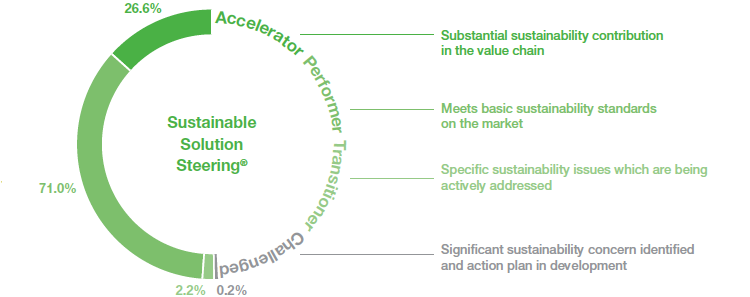Creating value
- Creating value along the entire value chain
- New goal for products that make a particular contribution to sustainability
We promoted sustainability topics in 2015 through various projects together with partners along the value chain. With the help of our ecoefficiency analysis, for example, we analyzed the economic and environmental implications of various coating processes in a study conducted with Dürr, a machine and plant manufacturing company, and with our customer BMW. The goal was to discover ways to improve the ecoefficiency of serial coating methods, such as by saving resources. The study showed that the “integrated process” – a coating procedure that saves a paint layer – represents a more economical and ecological alternative to other processes evaluated.
For the 2015 business year, BASF conducted sustainability assessments and ratings for 95.4% of its entire portfolio of more than 60,000 specific product applications – which account for €64.9 billion in sales – using the Sustainable Solution Steering® method. This externally validated procedure allows us to determine how our products contribute to sustainability, and we consider their application in various markets and industries.
2020 Goal
28%
Proportion of sales generated by Accelerator products
We want to increase the proportion of “Accelerator” products in the long term: in other words, products that contribute particularly to sustainability in the value chain, and are characterized by, on average, higher growth rates and profitability. We have therefore set ourselves a concrete goal in 2015: By 2020, we aim to raise the proportion of sales from Accelerator products to 28%. At 26.6%, this figure already closely approached the 2020 target in 2015. This development is mainly based on portfolio measures undertaken in 2015, especially in the Oil & Gas segment.
Sustainable Solution Steering®: How BASF’s products contribute to sustainability

One of these Accelerator products is Elastocool® Advanced – an innovative insulation material for refrigerators and freezers. It boasts a high level of resource efficiency while also possessing improved insulation properties. Elastocool® contributes to achieving the E.U.’s top energy efficiency levels in refrigerators and freezers.
The chelating agent Trilon® M is another Accelerator, having established itself as a high-performance alternative to phosphate in dishwashing machine detergents. European Union regulations will almost entirely prohibit the use of phosphates for this application in Europe starting 2017. Chelating agents’ most important task is to intercept metal ions in dishwasher water in order to inhibit calcium buildup on dishes. Trilon® M is readily biodegradable, and also improves cleaning power while fulfilling the criteria for the E.U. Ecolabel.
For all products that are classified as “Challenged” and do not fulfill our major sustainability criteria, we want to develop prompt plans of action. These action plans can include research projects, reformulations or even replacing one product with an alternative product. Based on the results of the initial analyses, action plans had been created for 99% of all Challenged products by the end of 2015.
The products for which we have developed action plans include, for example, polyfluorinated substances that are often used in paper packaging coatings for their water and oil-resistant properties. Although European authorities regard any hazard to people or the environment as very low, stricter regulations are anticipated in the future as these substances biodegrade with difficulty. As a result, the Sustainable Solution Steering® method has classified them as Challenged in their use for paper coatings. BASF decided early on not to continue selling these substances. The new product solutions use substances whose chemical properties prevent them from accumulating in the environment. Furthermore, paper coated with these new materials is biodegradable and can either be processed into compost by composting facilities (ecovio®) or recycled (Ultramid® and Epotal®). We will market oil-proof barriers based on these products in the future; they are classified as Accelerators.
For more on our sustainability instruments, see:
basf.com/measurement-methods
Raw materials